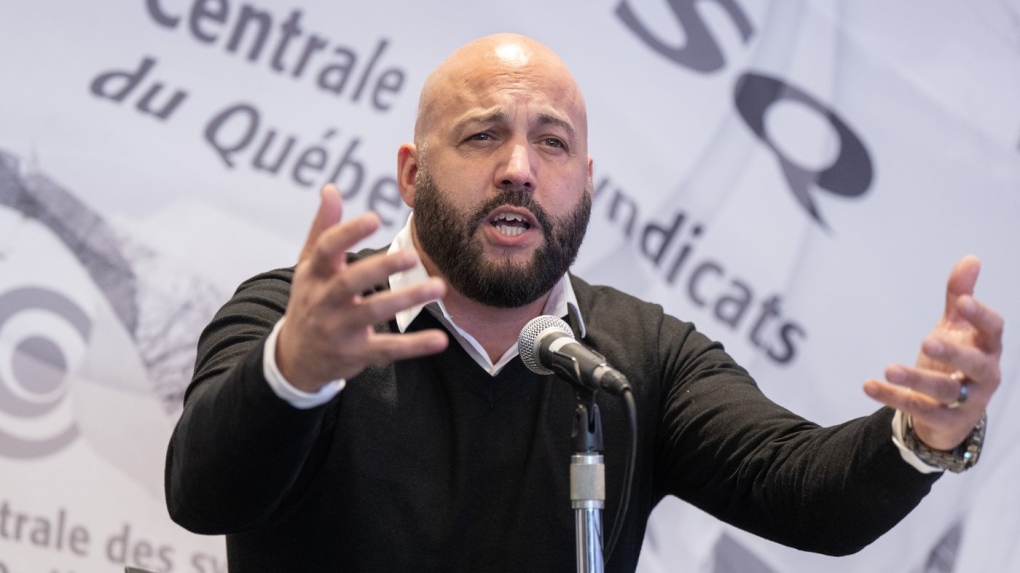Post-strike catch-up for schools: Union president says Quebec doesn't need to cut spring break, extend semester
With the post-strike catch-up plan to be unveiled on Tuesday, CSQ president Éric Gingras believes it's possible to "make adjustments" without cutting spring break or extending classes into June.
The Centrale des syndicats du Québec, which is part of the common front, only held eight strike days, unlike the Fédération autonome de l'enseignement, which held a month-long walkout.
At a press conference to mark the start of the January school year in Montreal on Monday, Gingras pointed out that days are always set aside for snowstorms, ice storms and other situations during the school year.
He also hopes that the Ministry of Education will leave it up to the schools to decide and show "flexibility" since the situation could be different in Gaspésie, Saguenay and on Montreal's South Shore.
The CSQ president also notes that he would have liked the ministry to have consulted the players involved in education rather than making its announcement unilaterally, as it is set to do on Tuesday.
"Everyone has to roll up their sleeves, has some work to do. If there are adjustments, we're ready to discuss them," Gingras said. "We don't want our backs to the wall. We don't want things imposed on us."
On the subject of the common front's agreement in principle, which was approved by the respective bodies of the four union organizations and will be submitted to the 420,000 members starting in mid-January, Gingras said he was "confident."
 CSQ president Eric Gingras lays out the union's plans for this year during a press conference Monday, Jan. 8, 2024 in Montreal. THE CANADIAN PRESS/Ryan Remiorz
CSQ president Eric Gingras lays out the union's plans for this year during a press conference Monday, Jan. 8, 2024 in Montreal. THE CANADIAN PRESS/Ryan Remiorz
The CSQ does not "recommend" the agreement to its members but "submits" it to them. It's not that the CSQ isn't fully satisfied with the agreement; it prefers to leave all the latitude to its members once they have all the information at the information meetings.
"I'm very comfortable with having confidence. We think we're presenting something interesting. I trust our members to make the best reading," said the CSQ president.
He noted, for example, that school support employees who live in precarious conditions with 17-hour work weeks will see their situation improve. And there have also been advances in terms of classroom aids to lighten teachers' workloads, he added, preferring to leave the details to his federations.
As for the negotiations themselves, the CSQ president reiterated that another way would have to be found to avoid the "psychodrama" of long and difficult negotiations.
The next agreement -- if approved by the members -- will last five years, giving the parties, accustomed to three-year contracts, some breathing space.
He continues to believe that "it doesn't make sense" that negotiations have lasted this long. The union demands were tabled in autumn 2022; the management offers in December 2022. The assumption of a common front settlement came on December 28, 2023.
"There's something to think about. I think it's the public who can put the best pressure on the government to say 'never again'," said Gingras.
This report by The Canadian Press was first published in French on Jan. 8, 2024.
CTVNews.ca Top Stories

opinion Tom Mulcair: Prime Minister Justin Trudeau's train wreck of a final act
In his latest column for CTVNews.ca, former NDP leader and political analyst Tom Mulcair puts a spotlight on the 'spectacular failure' of Prime Minister Justin Trudeau's final act on the political stage.
B.C. mayor gets calls from across Canada about 'crazy' plan to recruit doctors
A British Columbia community's "out-of-the-box" plan to ease its family doctor shortage by hiring physicians as city employees is sparking interest from across Canada, says Colwood Mayor Doug Kobayashi.
'There’s no support': Domestic abuse survivor shares difficulties leaving her relationship
An Edmonton woman who tried to flee an abusive relationship ended up back where she started in part due to a lack of shelter space.
opinion King Charles' Christmas: Who's in and who's out this year?
Christmas 2024 is set to be a Christmas like no other for the Royal Family, says royal commentator Afua Hagan. King Charles III has initiated the most important and significant transformation of royal Christmas celebrations in decades.
Baseball Hall of Famer Rickey Henderson dead at 65, reports say
Rickey Henderson, a Baseball Hall of Famer and Major League Baseball’s all-time stolen bases leader, is dead at 65, according to multiple reports.
Arizona third-grader saves choking friend
An Arizona third-grader is being recognized by his local fire department after saving a friend from choking.
Germans mourn the 5 killed and 200 injured in the apparent attack on a Christmas market
Germans on Saturday mourned the victims of an apparent attack in which authorities say a doctor drove into a busy outdoor Christmas market, killing five people, injuring 200 others and shaking the public’s sense of security at what would otherwise be a time of joy.
Blake Lively accuses 'It Ends With Us' director Justin Baldoni of harassment and smear campaign
Blake Lively has accused her 'It Ends With Us' director and co-star Justin Baldoni of sexual harassment on the set of the movie and a subsequent effort to “destroy' her reputation in a legal complaint.
Oysters distributed in B.C., Alberta, Ontario recalled for norovirus contamination
The Canadian Food Inspection Agency has issued a recall due to possible norovirus contamination of certain oysters distributed in British Columbia, Alberta and Ontario.


































